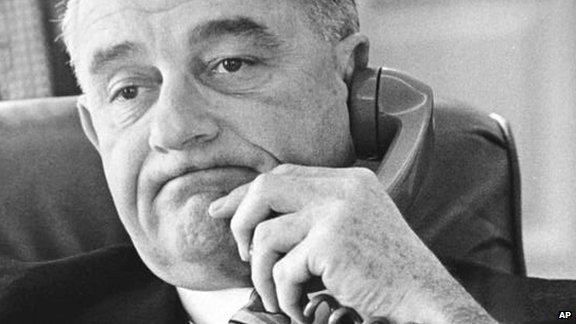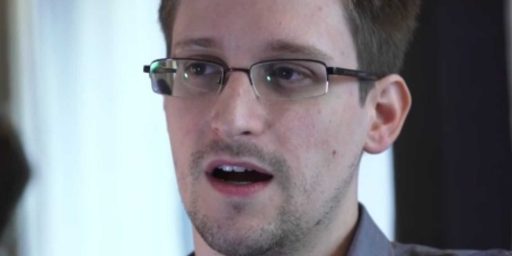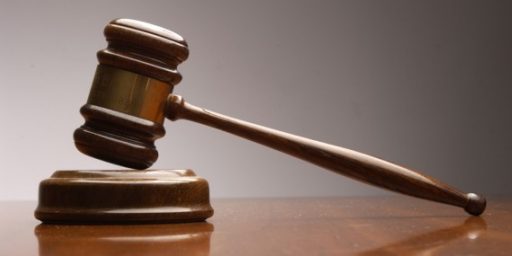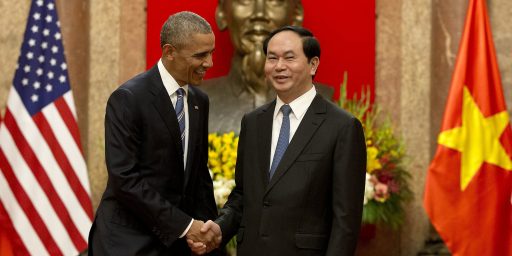LBJ Tapes: Nixon Sabotaged Vietnam Peace Talks
The final release of President Lyndon Johnson's tape recordings reveals a bizarre plot.
The final release of President Lyndon Johnson’s tape recordings reveals a bizarre plot.
BBC (“The Lyndon Johnson tapes: Richard Nixon’s ‘treason’“):
By the time of the election in November 1968, LBJ had evidence Nixon had sabotaged the Vietnam war peace talks – or, as he put it, that Nixon was guilty of treason and had “blood on his hands”.
The BBC’s former Washington correspondent Charles Wheeler learned of this in 1994 and conducted a series of interviews with key Johnson staff, such as defence secretary Clark Clifford, and national security adviser Walt Rostow.
But by the time the tapes were declassified in 2008 all the main protagonists had died, including Wheeler.
Now, for the first time, the whole story can be told.
It begins in the summer of 1968. Nixon feared a breakthrough at the Paris Peace talks designed to find a negotiated settlement to the Vietnam war, and he knew this would derail his campaign.
He therefore set up a clandestine back-channel involving Anna Chennault, a senior campaign adviser.
At a July meeting in Nixon’s New York apartment, the South Vietnamese ambassador was told Chennault represented Nixon and spoke for the campaign. If any message needed to be passed to the South Vietnamese president, Nguyen Van Thieu, it would come via Chennault.
In late October 1968 there were major concessions from Hanoi which promised to allow meaningful talks to get underway in Paris – concessions that would justify Johnson calling for a complete bombing halt of North Vietnam. This was exactly what Nixon feared.
Chennault was despatched to the South Vietnamese embassy with a clear message: the South Vietnamese government should withdraw from the talks, refuse to deal with Johnson, and if Nixon was elected, they would get a much better deal.
So on the eve of his planned announcement of a halt to the bombing, Johnson learned the South Vietnamese were pulling out.
He was also told why. The FBI had bugged the ambassador’s phone and a transcripts of Anna Chennault’s calls were sent to the White House. In one conversation she tells the ambassador to “just hang on through election”.
Johnson was told by Defence Secretary Clifford that the interference was illegal and threatened the chance for peace.
In a series of remarkable White House recordings we can hear Johnson’s reaction to the news.
In one call to Senator Richard Russell he says: “We have found that our friend, the Republican nominee, our California friend, has been playing on the outskirts with our enemies and our friends both, he has been doing it through rather subterranean sources. Mrs Chennault is warning the South Vietnamese not to get pulled into this Johnson move.”
He orders the Nixon campaign to be placed under FBI surveillance and demands to know if Nixon is personally involved.
When he became convinced it was being orchestrated by the Republican candidate, the president called Senator Everett Dirksen, the Republican leader in the Senate to get a message to Nixon.
The president knew what was going on, Nixon should back off and the subterfuge amounted to treason.
Publicly Nixon was suggesting he had no idea why the South Vietnamese withdrew from the talks. He even offered to travel to Saigon to get them back to the negotiating table.
Johnson felt it was the ultimate expression of political hypocrisy but in calls recorded with Clifford they express the fear that going public would require revealing the FBI were bugging the ambassador’s phone and the National Security Agency (NSA) was intercepting his communications with Saigon.
So they decided to say nothing.
The president did let Humphrey know and gave him enough information to sink his opponent. But by then, a few days from the election, Humphrey had been told he had closed the gap with Nixon and would win the presidency. So Humphrey decided it would be too disruptive to the country to accuse the Republicans of treason, if the Democrats were going to win anyway.
Nixon ended his campaign by suggesting the administration war policy was in shambles. They couldn’t even get the South Vietnamese to the negotiating table.
He won by less than 1% of the popular vote.
Once in office he escalated the war into Laos and Cambodia, with the loss of an additional 22,000 American lives, before finally settling for a peace agreement in 1973 that was within grasp in 1968.
Fascinating all around.
I’m not sure in what sense talking to one’s allies and convincing them that they could get a better deal if they held off constitutes “treason.” But it is certainly an illegal interference in US foreign policy. And, if true, a lot more people got killed for nothing.
At the same time, it’s pretty clear that the LBJ and Nixon presidencies were mirror images of one another. Both men were incredibly paranoid and willing to break the law on a routine basis—and knowingly tape record themselves doing it for posterity! In this case, LBJ was illegally spying on Americans and surreptitiously providing illegally obtained, classified information to Humphrey for the sake of a political campaign.
It’s all pretty despicable.







LBJ was illegally spying on Americans and surreptitiously providing illegally obtained, classified information to Humphrey for the sake of a political campaign.
Weird that this is your take away. Not Nixon illegally derailing peace talks for the sake of a political campaign. Or the thousands of dead and millions of dollars wasted on what they knew by then was a failed war, all for the sake of a political campaign. But since this was found out illegally by LBJ doing something despicable, it is the problem and not Nixon’s actions. Both bad but only one cost lives.
@Dave: You seem to have skipped over the paragraph where I talked about that. And the headline of the post.
The difference between the two is that we know for certain that LBJ did what he is being accused of; it’s on his own tapes.
Yes, what Nixon did was despicable, and cost several thousand young men their lives. But Johnson bears just as much blame for escalating the war in the first place with the phony Gulf of Tonkin incident.
Both men have blood not just on their hands, they are literally drowning in it.
Conservatives trying to cut themselves a best deal at the cost of American lives?
I am shocked… Shocked !!
Wait… This happens often?
* Nixon and Viet Nam
* Reagan and Iranian Hostages / Iran-Contra
* W. Bush and Iraq
… shocked.
The source:
Original Post:
What? I thought LBJ found out what Nixon was up to in the course of spying on an ally–and an unreliable one at that, as it turned out.
Treason? Maybe. Mass murder? Absolutely.
Oh, but wait — when a Republican deliberately sends thousands of Americans to die for nothing other than his own political advantage, that’s called Leadership.
@rachel:
It is beyond weak tea. Since when is wiretapping government communications that operate under the executive branch, by the executive branch illegal?
Then again the concept of just about any wiretap being illegal has fallen by the wayside over the past 12 years or so.
Nixon and Johnson were amazing. they were deeply flawed giants. Those 2 guys make current presidents and presidential wannabees seem like midgets. They are from, and of, another deeply troubled time.
@al-Ameda:
They’re the last presidents who had to think of the American public as innocent in their crimes. No president since Nixon has had to deal with people who would be outraged, with staffers who might resign or have moral objections, or with voters who have not been trained to be accomplices and hacks in imperial actions.
This is why Johnson sounds like a free man. Because he might be caught by the truth.
@bill:
You said yourself it was a proxy war. Would winning it have been so great? Would a capitalist Vietnam have ended Chinese or Russian socialism?
(We know that we didn’t need a capitalist Vietnam to do that, it happened anyway, as capitalist economic power outran, and lapped, the commies.)
@Modulo Myself:
I can’t disagree with you. Those two were bookends of sorts. So deeply flawed, and from a psychological/historical study standpoint – so interesting..
Beautiful equivalence there, Mr. Joyner. Mataconis-worthy for its transparent partisanship while simultaneously proclaiming to be above the fray.
The Johnson administration was secretly recording the South Vietnamese (not targeting Americans, to the best of our knowledge), and happened to catch Nixon on tape selling out America.
Nixon was selling out American servicemen for political gain, and very likely committing treason (I’ll leave that to the lawyers)
Exactly the same. Both sides do it. Sure.
what is also staggering is the continuing propensity of many Americans in this globalised world to be so parochial and self-centred: with comments above limiting themselves only to the likely impact on Americans had peace talks, without Nixon’s interference, been successful in ’68 or ’69.
There would have been no secret illegal American bombing of Cambodia or Laos,and there would very likely have been no Khmer Rouge orchestrated Year Zero. Perhaps several millions of Vietnamese, Cambodian and Laotian civilians would not have died, as well as tens of thousands of brave American service men & women, if Nixon had acted less selfishly and more honorably.
The idiotic and specious rationale used to justify the loss of so many lives as well as so much treasure…as we see with Iraq, the same kind of idiotic and specious rationale is still being used, just under a different name…
@bill:
How many times have you been to war, champ?
@Gustopher: I can only echo your reaction to this article.
LBJ’s administration was bugging the ambassador of a double-dealing “ally”.
Nixon’s campaign derailed peace talks for partisan advantage costing thousands of American lives, countless Indochinese lives and a fortune in treasure.
Dr. Joyner’s analysis – you cannot trust Democrat or Republican leaders.
My reaction to Dr. Joyner’s analysis – good grief!
(as for LBJ – it would have been grossly negligent not to have bugged the South Vietnamese ambassador in those days)
PEACE WITH HONOR!
…
Seems the bugging was of the SV ambassador, so it’s not clear to me that it was/should be illegal to tape an American citizen’s discussion with that ambassador. This could be ignorance on my part.
To anyone who has read the full transcript… is it clear that promises from the Nixon campaign were key in getting the SVs to pull out of the talks?
While this is old news (I saw this some time ago on some documentary about the 1968 election), I think that if Humphrey had another week or two he would have won by a slim margin. Also, the US could have won that war with a different strategy.
“Somebody wouldn’t let us win” (“Rambo”)
“Somebody wouldn’t let us win” (“Rambo”)
Hey Rambo, that somebody was God. There was no win here for the US.
Seeing how it turned out, with Vietnam now an ally and always thorn in China’s side – Eisenhower had it right keeping us out of the French fight to keep its Christian colony.
Kennedy and Johnson are faulted for being scaredy cats. Definitely not of the commies, but rather of the crooked slimebag for the ages Nixon (may he rot in hell) and his fellow travelers who’d tear down everything in a push for money and power and who finally saw penultimate victory in the 2000 elections)
Suuuuure. We never actually lose! We never pick fights we cannot win! We are only defeated when we’re sabotagued!
Or maybe there are actual limits to power? Maybe, just maybe, “winning” a war against a people willing to absorb millions of casualties to get the furriners out of their country just wasn’t gonna happen?
A few years ago, I came across a brilliant article (unfortunately I can’t recall the author) which argued that the Cold War would have ended 10 years earlier if we HAD NOT fought the war in Vietnam as it sapped our defense capabilities allowing the USSR to challenge us in other parts of the world while we were bogged down in SE Asia.
The premise of the domino theory which war hawks continually sought as justification was proved to be false, and the vast sums of $$$$ the war cost, grinded down our military which allowed the russians to expand into Asia and the ME, while we went through the tough road back from military over-reach.
It was a riveting premise backed by hindsight, history and facts. I concur with the premise.
Rachel Maddow broke the news about Nixon’s treason on her show this evening.
I felt sick and cried . . .
In any war if enough bombs and munitions are dropped, your opponent will concede. When a nation has no more infrastructure left to support the war it will end. This was true of the American Civil war, Japan in WWII, and recently Libya. This would have also been theoretically true of Vietnam. We all dove and hawk alike love to theorize, we seem to be retrospective “what if” creatures. The questions aren’t really could have we won, but the price and gains of “winning”. Will the world be a better place because we involve ourselves?
Some wars are unfortunately inevitable. This article presents a thought provoking take on the lead up to one war. Most wars no matter which flag is waving are either inevitable nor make the world a better place.
How much more grievous are the consequences of anger than the causes of it.
– General Marcus Aurelius
@Sidney Moore:
Me too. My brother went to Vietnam in 1970. He committed suicide in 2001. His suicide note was riddled with survivor’s guilt. He wanted to know why he was spared while his friends were not. He wanted to be with them. I hope he found the peace he was denied all those many years. How many other men came back badly damaged by their experience? I wonder how they and other Vietnam veterans feel about this…
Old news to many of us, but essentially unknown to most Americans.
And it was definitiely the template for Iran-Contra!!
Bugging the Ambassador’s phone is all in a day’s work for Hoover’s FBI. I’m not sure LBJ should be held accoutable for that, but it is interesting to think Hoover likely blackmailed Nixon with that juicy bit of intelligence. God only knows why the FBI ‘still’ refers to their national headquarters as the J. Edgar Hoover building.